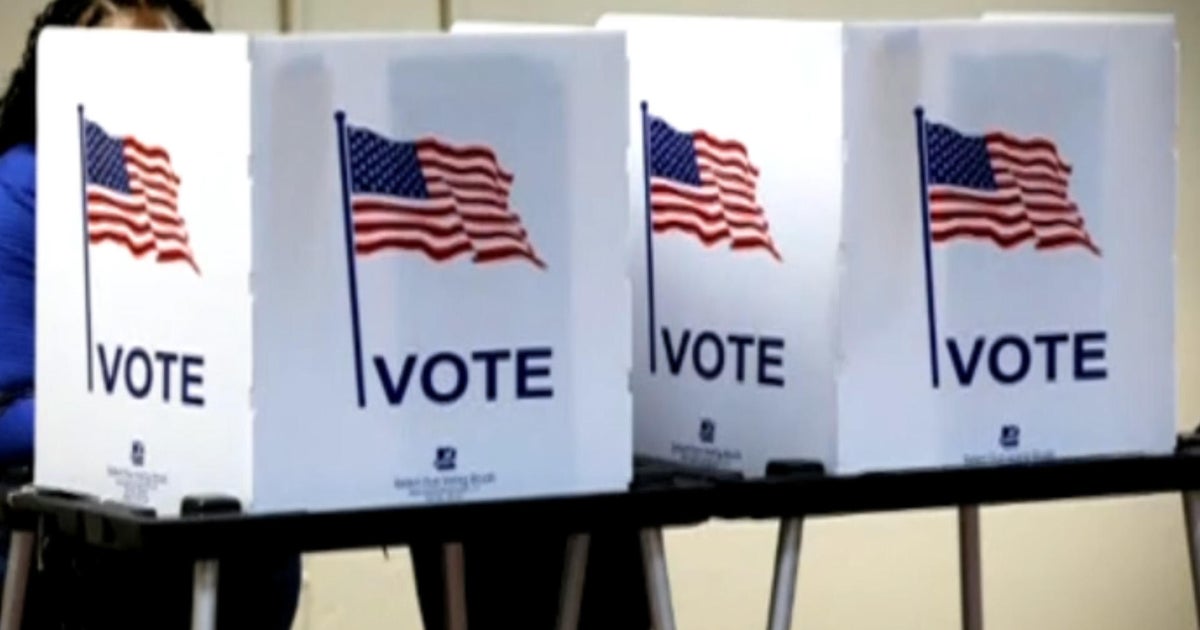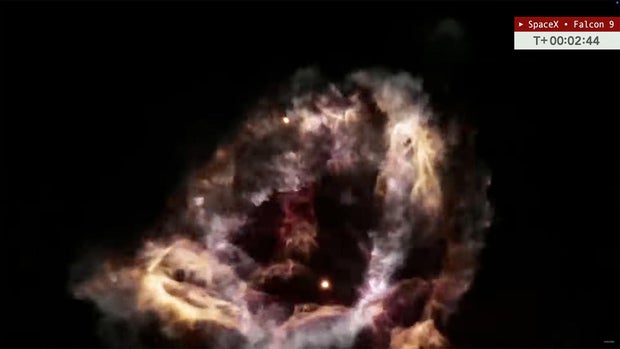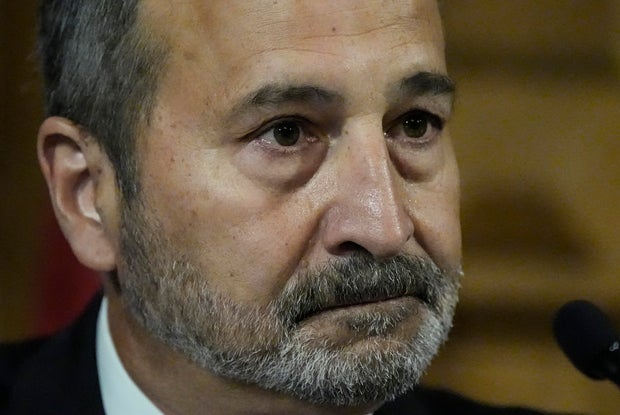CBS News
Fight in Alaska over only House seat

Watch CBS News
Be the first to know
Get browser notifications for breaking news, live events, and exclusive reporting.
CBS News
11/4: America Decides – CBS News

Watch CBS News
Be the first to know
Get browser notifications for breaking news, live events, and exclusive reporting.
CBS News
Cargo ship launched to space station with supplies, science gear and holiday treats for crew

SpaceX launched an unpiloted Dragon cargo ship Monday evening, an election eve flight to deliver three tons of crew supplies, science gear and other equipment to the International Space Station, including an unusual wooden satellite, a solar wind monitor and holiday fare for the lab’s crew.
The Dragon’s Falcon 9 rocket blasted off from historic launch pad 39A at the Kennedy Space Center at 9:29 p.m. EST, lighting up the night sky for miles around as it climbed away atop 1.7 million pounds of thrust.
NASA/SpaceX
After boosting the rocket out of the dense lower atmosphere, the first stage, making its fifth flight, peeled away, reversed course and headed back to an on-target landing at the Cape Canaveral Space Force Station while the second stage continued the climb to space.
The landing marked SpaceX’s 57th successful booster recovery at the Florida Space Force station and its 363rd overall, including California flights and droneship landings.
Spaceflight Now
Just under 10 minutes after liftoff, the vacuum-optimized engine powering the Falcon 9’s second stage shut down and one minute later, the Dragon was released to fly on its own. If all goes well, it will catch up with the space station Tuesday morning and move in for docking at the lab’s forward port at 10:15 a.m.
One of the first items on the agenda is a test Friday to determine the Cargo Dragon’s ability to boost the space station’s orbit slightly using its aft-facing thrusters. The ISS is routinely re-boosted by Russian Progress freighters and Northrop Grumman Cygnus cargo ships, but Friday’s test will be a first for SpaceX.
The California rocket builder is under contract to NASA to build a powerful space tug of sorts that can be used to safely drive the ISS back into the atmosphere when the lab complex is retired in the 2030 timeframe. The vehicle is needed to make sure the station breaks up over a stretch of ocean well away from populated areas and shipping lanes.
During the test Friday, the Cargo Dragon’s aft thrusters will fire for about 12 minutes.
“The data that we’re going to collect from this reboost and attitude control demonstration will be very helpful, informing SpaceX analyses on how the system performs,” said Jared Metter, SpaceX director of flight reliability. “This data is going to lead to future capabilities, namely the US de-orbit vehicle.”
Reboost aside, the Cargo Dragon is loaded with slightly more than 6,000 pounds of equipment and supplies, including 2,022 pounds of science gear, 2,119 pounds of crew clothing, food and other supplies, 377 pounds of spacewalk equipment, 525 pounds of space station hardware and 44 pounds of computer equipment.
One of the more unusual payloads: Lignosat, a small wooden satellite using a framework of magnolia panels built by researchers at Kyoto University in Japan and the Tokyo-based logging company Sumitomo.
STR/JIJI PRESS / AFP via Getty Images
“While some of you might think that wood in space seems a little counterintuitive, researchers hope that this investigation demonstrates that a wooden satellite can be more sustainable and less polluting for the environment than conventional satellites,” said Meghan Everett, the ISS deputy project scientist.
“The main objective here is to determine whether wood can be used in space, and to do this, researchers will measure the temperature and strain of the wooden structure and see how it might change in the vacuum environment of space with atomic oxygen and radiation conditions as well.”
As with all station-bound Dragon cargo ships, the crew supplies include fresh food and special treats for holiday meals.
Bill Spetch, ISS operations and integration manager, said the “food kit” includes “citrus, apples, sweet onions, blueberries, radishes, etc,” along with lobster, crab and quail for holiday meals. A variety of cheeses is on board as well as fresh coffee and personal items requested by each crew member.
Mounted in the Dragon’s unpressurized trunk section is the Coronal Diagnostic Experiment, or CODEX, an instrument that will be mounted outside the space station to learn more about how charged particles in the solar wind are heated to millions of degrees and accelerated to enormous velocities, affecting Earth’s space environment and the rest of the solar system.
Inside the station, the astronauts will have a variety of new experiments and instruments to operate and monitor, including one called ARTEMOSS that will examine how Antarctic moss tolerates the space radiation and microgravity environment to learn more about how plants might be used in future life support systems.
The European Space Agency is sending up a space exposure experiment to learn more about how high-tech materials respond to prolonged exposure to the weightless environment and another experiment to study how organic samples degrade when exposed to unfiltered ultraviolet light from the sun.
And in an experiment that could be particularly useful to future astronauts, a small device known as Nanolab Astrobeat, provided by the Malta College of Arts, Science and Technology, will test cold welding technology that could prove useful for repairing leaks or other damage from inside a spacecraft.
The Cargo Dragon is expected to remain docked at the space station for about a month before it returns to Earth with station components needing refurbishment, trash and other no-longer-needed items.
CBS News
Georgia State Election Board chair says all he’s seen is a “very smooth, well-run” election

John Fervier, chairman of Georgia’s State Election Board, is a mild-mannered corporate executive with a dry wit and an aversion to the spotlight. Yet in recent weeks he found himself at the center of a political storm as three of his MAGA-oriented board members pushed through rules that many believed would have caused chaos and confusion in Georgia during the presidential election.
The pro-Trump faction, which forms a majority of the board, passed one rule that would have required county election officials to hand-count every paper ballot on election night and another rule that required a “reasonable inquiry” before an election could be certified.
Both rules were ultimately rejected by Georgia courts, though the rulings have been appealed. Fervier talked to CBS News —his first sit down with a national outlet— about how he thinks the election has gone so far and what he’s expecting in the coming days.
The interview has been condensed and lightly edited for clarity.
Dan Klaidman: How’s the election going so far from your vantage point? You’ve been out there, traveling around, talking to poll workers, election administrators.
John Fervier: As chairman of the state election board, I felt it was necessary for me to have boots on the ground, to go out there and see what’s actually happening, specifically for Fulton County, because there were a lot of allegations, mostly unfounded allegations, from the 2020 election.
But I also wanted to see what was going on across the state. So last week, I was in South Georgia, I visited Camden County, visited Glynn County, and I have been to several locations in Gwinnett County. Now I’ve been to nine different locations in Fulton County. I’ve visited close to 15 polling locations now, and all I’ve seen is a very smooth, well-run, well-organized election.
I talked to people operating the poll pads, to voters. I talked to these security officers, and I talk to all the election monitors, whether they’re from the Democratic Party, Republican Party, or even the Libertarian Party, I just want to get their feeling of how things are going. I feel confident with the laws and the policies and procedures that are in place that we have a very secure election.
Mike Stewart / AP
Klaidman: You mentioned Fulton County, which was the object of a lot of the controversy back in 2020 and threats against poll workers —and people, including former President Trump, casting doubt on whether they ran a fair election. This past weekend, the state Republican party filed lawsuits over the county’s decision to allow people to drop off absentee ballots after the Friday deadline. A judge rejected their claim.
Fervier: Well, it’s a lot of disinformation being put out there. It’s people that just don’t understand or are actually just trying to create chaos.
There is no prohibition in statute of law that would keep a county from keeping their registrar’s office open on the weekend to collect absentee ballots. Some people want to say they’re continuing voting or continue doing this or that? No, it’s just people that are just dropping off their absentee ballots. They could drop them off at the post office. They can hand them over at the register’s office. They can hand them in on Election Day or during early voting period, or on the weekends if that’s what the county so desires. And that’s not against the statute.
Klaidman: So you think this is an effort to sow distrust in the election, or to suppress the vote?
Fervier: I don’t understand why anybody opposed it. Frankly, if you’re worried about ballot security, you should be in favor of this because they’re actually delivering them to a registrar and not putting a truckload of them in a mailbox someplace. So to me, I don’t know why you’d be opposed to this, and I’ve seen some people online using this to try to create chaos.
Russia election interference in Georgia
Klaidman: The FBI and U.S. intelligence community have said Russia has tried to interfere with the U.S. election. Last week the FBI linked a video purporting to show voter fraud in Georgia to Russian influence actors.
Fervier: To me, the bigger threat is the organic stuff that’s coming from within our country. You know, there are groups of people out there, they call themselves the Patriots or the Proud Boys or Antifa or whatever, and those are the ones that scare me more than the Russian bots, because they have organized groups out there that cause issues.
I’ve seen that on the State Election Board. You’ll have these people that will just gin up all this anxiety over issues and they’re just trying to create chaos and sow doubt and confusion in the election.
Klaidman: Have you seen any evidence of fraud?
Fervier: You got 5 to 7 million people voting. There’s going to be some small issues, but they want to talk about illegal immigrants voting. In my time on the board, I’ve never seen a case yet (involving) illegal immigrants (that) has come before the board.
They want to talk about all these dead people voting. I haven’t seen that.
Have there been instances of people double voting? Yes, there’s always going to be that. There’s always going to be those onesies and twosies out there. That’s going to happen. But this mass amount of people, they talk about mass amounts of dead people, or mass amount of illegal immigrants, or massive amount of anything, it’s just not happening. It’s not reality. But if you listen to some of these people on the internet or on Twitter you would think it’s just a big problem. It’s just not.
Klaidman: As the chairman of the State Election Board, (you) have been at the center of a controversy in Georgia over this election on the board itself. The MAGA-oriented majority pushed through some rules that could have delayed certification of the election, including a requirement that ballots be handcounted to ensure that (they) matched the number counted by machines, as well as one that allowed for a “reasonable inquiry” to look into potential fraud before certification. What do you think those board members’ motives were?
Fervier: You’ll have to ask them their motive. My positions for opposing these are well known, and I state them in the board meetings themselves. They think that these rules will enhance security of the elections. I don’t share that opinion with them.
Some of these rules seem to be fairly innocuous, until you start understanding exactly how they work. I oppose them because I don’t think they’re grounded in statute or allowed by law. I’m a small-government kind of guy. I don’t believe in the power of boards. I believe in the power of the legislature. The legislature is the ones that should be making election law, not state boards.
Anxieties about election boards and certification
Klaidman: There’s been concern, not just in Georgia but around the country, that some of these local election boards may simply refuse to certify their elections.
Fervier: The statute says that at 5 p.m. on the Monday following the election, the board “shall certify” the results of the election. It doesn’t say “maybe.” It doesn’t say “probably.” They have no discretion there.
Klaidman: How concerned are you that one or more members of one of these boards refuse to certify as an act of civil disobedience?
Fervier: Well, I think that’s likely to happen, having —frankly, I’ll be shocked if there wasn’t anyone in the state of Georgia that didn’t refuse to certify. I would be more concerned if I thought that a (full) board refused to certify. I think that that creates a significant problem. An individual won’t stop the certification. I am greatly concerned about if a board refuses to.
Klaidman: What recourse is there if that happens?
Fervier: If an individual refuses certifying, I could see somebody bringing a case before the state election board because they refuse to follow the law. It’ll be interesting to see if that occurs. We can also refer cases to the attorney general’s office or the local D.A. for prosecution.
Why is the election denial movement still strong?
Klaidman: What sort of insights have you gleaned over this past almost year, since you’ve been on the board about this election denial movement that’s been such a stubborn part of our politics?
Fervier: I don’t think people give enough credit to the chaos and confusion that was caused by COVID. In the 2020 election, when you had counties that found it very difficult to hire election workers or qualified election workers, you had people that wouldn’t go to the polls and vote by absentee ballot in record numbers. I think that there was a lot of human error that occurred in 2020 but I have yet to see any actual fraud, and I’ve looked at hundreds, if not thousands of pages of evidence that’s been put before me. And all that (alleged) fraud has been disproven time and time again, by the Georgia Bureau of Investigation, by the FBI, by reporters, by Republicans, by Democrats. I mean, it’s been disproven, and yet people can’t seem to get past it.
Threats against election officials as tensions rise
Klaidman: Many have heard about Ruby Freeman and her daughter Shay Moss, poll workers in Fulton County who were the targets of horrific threats of violence and racial attacks. What is your sense of the threat environment right now, a day before the election?
Fervier: I would tell you that for our board, the threats were spiking back in the August-September time frame, when all the rules were being proposed for our board. They’ve significantly reduced in the last couple weeks.
Klaidman: You received death threats?
Fervier: I’ve received some. But as I go around to the polls, I haven’t heard of a single instance of any threats. There was only two instances I’ve heard of where the police had to be notified, and it was because voters were wearing campaigning gear that they shouldn’t have been wearing. You’re not allowed to wear partisan gear within 150 feet of the polls.
Klaidman: Are you worried about physical violence?
Fervier: I think that we need to be prepared for it. There are crazy people out there, crazy people on the right and the left, and emotions and passions are high. Every polling place I’ve been at has had security officers there, which gives me a lot of confidence, and gives the voters and election workers a lot of confidence. It’s something we have to be concerned about but I haven’t heard of or seen any threats yet.
Klaidman: We used to take for granted that the people who administer our elections did so in a nonpartisan way. Can we still do that?
Fervier: We’ve all got opinions. The question is whether you can be nonpartisan in your work. My position is nonpartisan by statute, and I take that extremely seriously. I don’t care if you’re a Democrat or Republican, libertarian, Green Party. It doesn’t matter to me — everybody deserves a voice. Everybody deserves to vote. And it’s extremely important to me that all of us in the election system, whether it’s the poll workers or the poll superintendents or the boards or anybody, act in a nonpartisan manner.
Klaidman: What’s your day look like on Election Day?
Fervier: Busy, busy, busy. I’m going to start out at 7 a.m. in the polls and probably finish up at midnight with the secretary of state’s office, watching all the returns come in. I would like to hit 10 to 15 polls during the day at least. And when I go into a poll, I want to shake the hand of every poll worker there, because I am extremely grateful for the hard work and the time and their patience and what they’ve done over the last three, four weeks in bringing about a safe and secure election for Georgia. These people work hard, and they deserve our appreciation.












